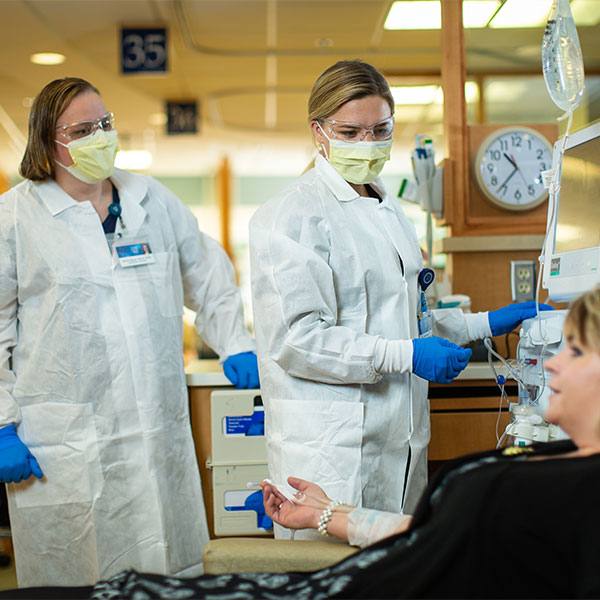-
Biotherapeutics
Science Saturday: Could regenerative medicine relieve neck, back pain?
Mayo Clinic is looking to regenerative medicine as a potential long-term solution for degenerative disk disease that has for years eluded medical science. Millions of people in the U.S. are afflicted with chronic neck and back pain that often comes after years of wear and tear on the spine. Current treatments provide only temporary relief for this common disorder, and finding a cure has been a great challenge for researchers.
Wenchun Qu, M.D., Ph.D., a physiatrist and pain specialist at Mayo Clinic in Florida, and director of Regenerative Pain Medicine at the Center for Regenerative Medicine, hypothesizes that therapeutic answers to degenerative disk disease are hidden in mesenchymal stem cells. These adult stem cells have been well-studied and shown to be safe in humans.
"My study in preclinical models showed mesenchymal stem cells are very effective in treating the degenerative disk condition in animals. We have advanced to testing mesenchymal stem cells in large, phase three clinical trials in collaboration with industry sponsors, and we are waiting for the result to be released," says Dr. Qu. "Now we are developing the next generation of mesenchymal stem cells that show the potential to be more powerful in treating the degenerative disk disease."
Mayo Clinic's Center for Regenerative Medicine supports research that advances new regenerative biotherapeutics into the practice to address unmet patient needs. The Connor Group Kids and Community Partners also supported Dr. Qu's research.
The difficulty of treating back, neck pain
Spinal disks are pliable, rubberlike pads made of collagen and proteins that provide a cushion between the bones in the vertebrae. They give the spine its flexibility. As people age, disks may rupture, triggering inflammation that diminishes water molecules. Loss of water causes further deterioration that over time may lead to a collapse of the disk. People with degenerative disk disease may experience sharp pain, stiffness and mobility problems. That may lead to quality of life issues, such as lost work, lower function and restrictions in activities that sometimes affect an entire family.

"Preclinical models showed mesenchymal stem cells are very effective in treating the degenerative disk condition in animals."
Image taken prior to COVID-19 pandemic
Since spinal disks have no blood supply, they cannot be healed or regenerate. Many treatments have tried to ease the painful symptoms of spinal deterioration, including intradiscal injections to control inflammation and electrothermal therapy that sends jolts of electrical pulses to dull nerves carrying pain signals.
"As time goes by, follow-up data from patients have shown that these treatments are not better than placebo, and they pretty much have been abandoned," says Dr. Qu.
When other treatments fail, patients often choose surgery to fuse bones where the disk has failed. However, spinal fusion surgery may not achieve long-term pain relief.
Regenerative procedures offer an alternative
Dr. Qu's hypothesis is that mesenchymal stem cells could provide a new option for reducing inflammation, relieving pain and restoring spinal disks. He is applying his research to a regenerative medicine service he began at Mayo Clinic in Rochester and has now introduced at Mayo Clinic in Florida.
"We believe mesenchymal stem cells decrease the loss of water molecules from the injured spinal disk by controlling the inflammatory process in the disk. If you have less inflammation, you should have less pain," says Dr. Qu. "Mesenchymal stem cells provide growth factors and tissue regeneration that stimulate production of healthy disk cells."

Platelet rich plasma is derived from platelets spun from blood
Working with the Mayo Clinic Department of Pain Medicine in Florida, Dr. Qu is providing two regenerative options for patients with back and neck pain. Bone marrow aspirate concentrate — also known as BMAC — is a procedure in which stem cells with growth factors obtained from a patient's own bone marrow are injected into affected joints. A second procedure is platelet rich plasma — known as PRP — in which platelets spun from a person's own blood are injected to affected joints. Sometimes he will combine the two procedures, injecting bone marrow aspirate concentrate and following up with platelet-rich plasma. A booster shot of platelet-rich plasma is sometimes used in select cases months later.
"We are seeing promising findings in terms of pain relief and functional gains in patients with degenerative disk disease," says Dr. Qu. "Our experience shows no significant side effects, and we are continuing to follow the patients for their pain and functional response to these procedures."
The procedures are conducted according to Food and Drug Administration (FDA) guidelines for safety, and patients are monitored closely. Because the FDA considers bone marrow aspirate concentrate and platelet-rich plasma to be experimental, insurance does not cover them.
Additional research needed
Dr. Qu says additional research is needed to confirm his hypotheses and build a database of responses to the cell therapies for degenerative disk disease. Dr. Qu is leading other regenerative medicine research to investigate the safety, feasibility and effectiveness of using bone marrow-derived mesenchymal stem cells to treat spine osteoarthritis. This research is supported by a grant from The Louis V. Gerstner, Jr. Fund at Vanguard Charitable and by generous philanthropy from Jeff and Mary Werbalowsky. Dr. Qu's research is approved by the FDA as an investigational new drug, but it could take a few years before it is fully tested and an FDA decision is made on approval for use in daily patient care.
To learn more about bone marrow aspirate concentrate or platelet-rich plasma for degenerative disk disease and spine arthritis, call the Mayo Clinic appointment line in Florida at 904-953-0853.
###








